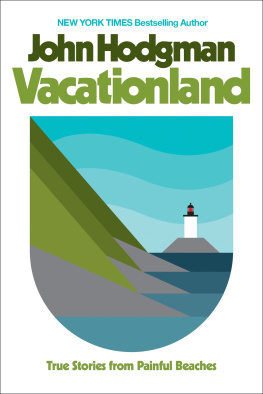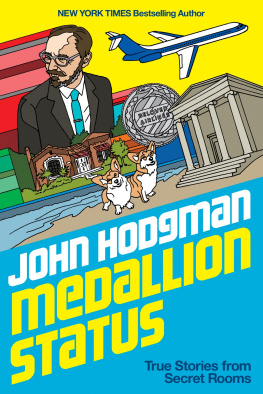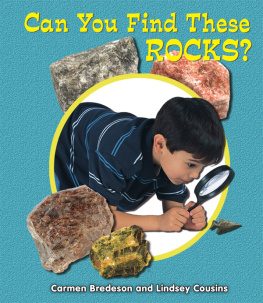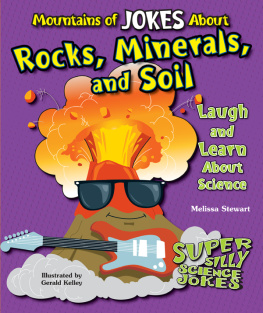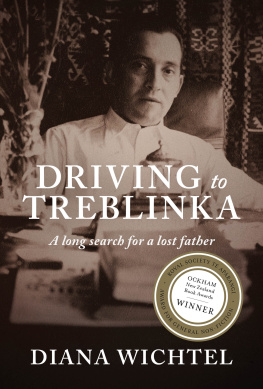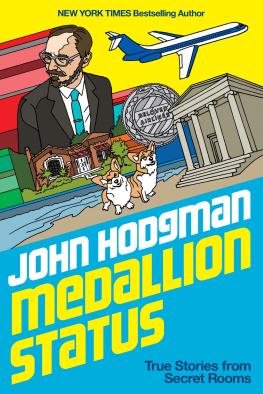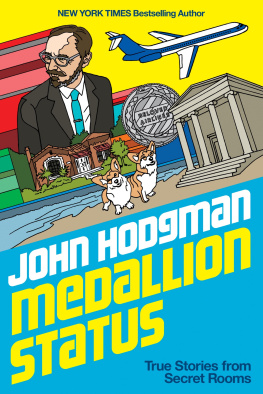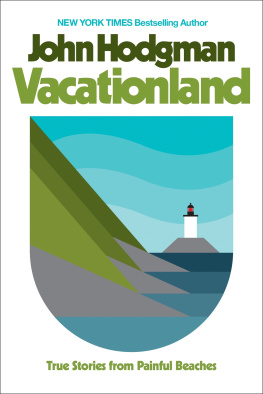ALSO BY JOHN HODGMAN
The Areas of My Expertise
More Information Than You Require
That Is All
VIKING
An imprint of Penguin Random House LLC
375 Hudson Street
New York, New York 10014
penguin.com
Copyright 2017 by John Hodgman
Penguin supports copyright. Copyright fuels creativity, encourages diverse voices, promotes free speech, and creates a vibrant culture. Thank you for buying an authorized edition of this book and for complying with copyright laws by not reproducing, scanning, or distributing any part of it in any form without permission. You are supporting writers and allowing Penguin to continue to publish books for every reader.
ISBN 9780735224803 (hardcover)
ISBN 9780735224810 (e-book)
Version_1
For Eileen Callahan Hodgman
~
CONTENTS
The Bookkeeper for the Church of Satan
I apologize for my beard. Not only because it is terriblethin, patchy, and asymmetricalbut also because it is inexplicable. Many people have asked me why I grew it, and most of those people are my wife, and to them and to her I say: I dont know. Im sorry.
Before my beard I just had a mustache, and that was not mysterious at all. In fact, I have grown two mustaches in my life, for equally banal, emotionally transparent reasons. I grew the first one in 1999, in the yearlong run-up to my marriage to the woman who is still my wife. I had only ever been clean-shaven before then (aside from an obligatory early-90s flirtation with a soul patch in college), and I suppose now I was testing her. A few very good-looking people I know turn mean when they drink, mocking and abusing the people who care about them. They make themselves ugly to see if people will still love them that way. I think my mustachethick and dark and unwanted in the middle of my round pale faceserved the same function: to be repulsive on purpose. I looked like a bushy nineteenth-century president who also happened to be a baby.
Luckily, my then-fiance, whom I have known since high school and who had already seen me through various thicks and thins, did not take the bait. She did not confirm my fear that I was an unlovable fraud and did not decline to marry President Chester A. Baby. So I shaved off my mustache the morning after my bachelor weekend in a dilapidated mansion in Atlantic City that I had rented with a group of friends. I cannot remember whether this was my decision or her command. Maintaining such fogginess about free will is, I think, a secret to a lasting marriage. And ours has lasted. You have the numbers in front of you, so you can do the math. (I have never been good with subtraction, especially with odd numbers like 1999 and 2017.)
I grew my second, and currently enduring, mustache in 2011. By that time we had two children, whose actual names will never be revealed. As you know, I have always hesitated to talk about my children and, when pressed, would refer to our daughter only as Hodgmina and our son as Hodgmanillo. In the past I have said that this is to protect their privacy, and that is true of our son who is, as of this writing, still young enough to like us. There are many joys of parenting, but ultimately we are robots training our own upgrades to replace us. But my son doesnt know this yet. He doesnt know that his job is to grow and thrive apart from us and conspire with time in our destruction. He still holds our hands and does not treat us like we are hopelessly stupid and so I wish to protect him.
But Hodgmina is now a luminously smart teenager with a strong social media presence who I think would enjoy being named in this book. So I keep her anonymous to spite her. I love her. I hope of course that she will outlive me (these are the fun hopes you nurture when you are older). But I do not need to help her outpace me in fame.
Insecurely teasing a teenager is a privilege of fatherhood. And I grew my second mustache for the same reason all your weird dads grew theirs: it is an evolutionary signal that says, Im all done. A mustache sends a visual message to the mating population of Earth that says, No thank you. I have procreated. My DNA is out in the world, and so I no longer deserve physical affection. Instead, it is time for me to turn away from sex and toward new pursuits, the classic weird dad hobbies such as puns, learning trivia about bridges and wars, and dreaming about societal collapse and global apocalypse.
All dads dream about the end of the world. It is a comfort to them. For some, the fantasy is blunt, vengeful, and aspirational. The zombie epidemic story, as one example, is consistently popular for a simple reason: when chaos consumes civilization, you can start over. You get to be young again. All your debts, real and emotional, are canceled. Whatever your dumb job used to be, it has now been replaced with the sole, exciting occupation of survival via crossbow or samurai sword. You get to dress up and wear armor or an eyepatch. And since your neighbors have now been transformed into the idiot monsters you always believed them to be, the zombie epidemic offers you moral permission to shoot them in the head, finally.
(This is not my fantasy, by the way. I have often thought that if The Walking Dead really wanted to provoke horror, its last season would time-jump five years to a future in which the government re-forms, the zombies have been cured [aside from the ones our heroes decapitated], and all the characters have to get dumb jobs again. The humans will have to work alongside the horribly mutilated cured zombies and think about what they did to survive, and what they became, while they all sit around in the break room together with their reheated soups. That said, I dont want to sound snobby about zombies. I get it. If there were a zombie show that just featured the characters endlessly raiding supermarkets for canned goods and then stocking those cans neatly back in their compound pantry, I would watch it for nineteen seasons. Guns and power and the weird masculine redemption fantasy of white dudes getting back to running things has never meant as much to me as abundant, well-organized food.)
The apocalypse I dreamed of was different, and presented a different consolation. I was in the Pioneer Valley, in the western part of my home commonwealth of Massachusetts, an important place in my life. I was sitting in the Montague Bookmill, a used-book store inside a creaky old sawmill that looks about to collapse into the shallow little river that once powered it. It was where I had written a lot of my first two books, and I was now trying to start another. But I was having trouble because I had just realized that I was not going to live forever.
The thought had never occurred to me before. I am a straight white man, the hero of almost every story I had ever encountered. Whats more, I am an only child. The idea that the world could continue without me was not only unimaginable, it was insulting. But in that moment, something shifted. I was upstairs at the Bookmill alone, sitting at a nicked wooden table before two open windows, their glass wavy with age. The door behind me was open and full of sun, the ancient eaves above me cold with summer shadow, the little river giggling outside as it slowly consumed its rocky foundation. I was halfway through my fortieth year, Mustache II in graying bloom, writing a book in a used-book store, exactly where books go to die. And then it was a physical sensation that I remember: suddenly I was gripped, just above my stomach, by the dumb, offensive truth. Everything ends. Nothing lasts. Not even John Hodgman.

